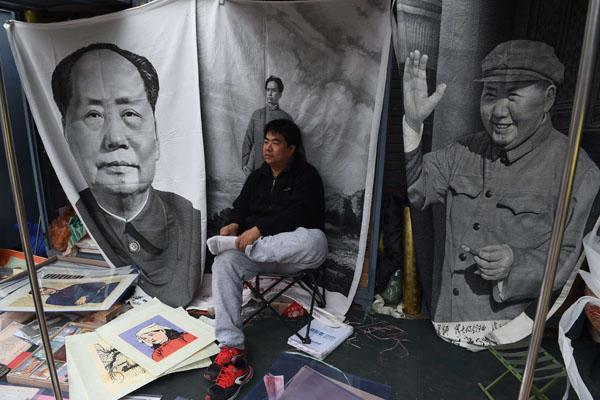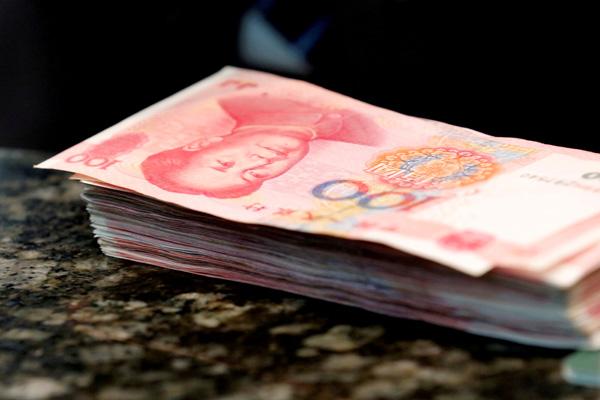You are here
China should not defend to the death any goal — Premier Li
By Reuters - Oct 25,2015 - Last updated at Oct 25,2015

A vendor waits for customers for wall hangings of late communist leader Mao Zedong at a market in Beijing on Sudnay. China's leaders will gather on Monday to hash out a new five-year plan to battle slowing growth, and analysts say they must choose between chasing a traditional GDP target and embracing reforms such as to the ‘one-child policy’ to help the country develop its full potential (AFP photo)
BEIJING — China has never said the economy must grow 7 per cent this year, Premier Li Keqiang said in comments reported by the government ahead of a key meeting this week that will set economic and social targets for the next five years.
Li's comments coincide with remarks by a top central bank official, who said on Saturday that China would be able to keep annual economic growth at around 6-7 per cent over that period.
The statements come at a time of growing concern in global financial markets over China's once mighty economic juggernaut.
China cut interest rates for the sixth time in less than a year on Friday. Monetary policy easing in the world's second-largest economy is at its most aggressive since the 2008/09 financial crisis, as growth looks set to slip to a 25-year low this year of under 7 per cent.
China's economy grew 6.9 per cent in the July-to-September quarter from a year earlier, data showed last week.
Speaking on Friday at the Central Party School, which trains rising officials, Li said the economic difficulties ahead for China should not be underestimated.
His report to the annual meeting of parliament set this year's gross domestic product (GDP) growth target at about 7 per cent.
"We have never said that we should defend to the death any goal, but that the economy should operate within a reasonable range," the central government paraphrased Li as saying in a statement released on its website late on Saturday.
Chinese leaders will signal that growth is their priority over reform by setting a growth target of around 7 per cent in the next long-term plan, policy insiders say.
The party's central committee will meet from Monday to Thursday to set out the 13th Five-Year Plan.
The party's People's Daily on Sunday listed on its microblog what it said were 10 focus areas for the Five-Year Plan, including maintaining economic growth, improving the industrial structure and pushing forward innovation. It gave no details.
Nevertheless, while the focus is on growth, China is still moving ahead on financial reforms.
Besides cutting interest rates on Friday, the People's Bank of China (PBoC) said it was also freeing the interest rate market by scrapping a ceiling on deposit rates.
The change, which Beijing had promised to deliver for months, will in theory allow banks to price loans according to their risk, and remove a distortion to the price of credit that analysts say fuels wasteful investment in China.
It should also offer some reassurance to financial markets after they were unsettled by the chaotic responses to the country's recent stock market plunge and then a yuan devaluation.
The deposit rate reform builds on the introduction of deposit insurance, creating space for smaller banks to compete with their bigger rivals
It is seen as a long-term step towards a more market-driven banking sector, if smaller banks lend funds to parts of the economy shunned by large banks.
‘New normal’
China's economic growth has not been bad over the last year considering the problems in the global economy, Li said.
There were reasons for optimism going forward, such as rising employment, more spending on tourism and a fast growing service sector, Li added.
"The hard work of people up and down the country and the enormous potential of China's economy gives us more confidence that we can overcome the various difficulties," he elaborated.
While the government has flagged a "new normal" of slower growth as it tries to shift the economy to sustainable, consumption-led growth, official data shows it has consistently at least met, and mostly exceeded, the growth targets it sets.
Beijing needs average growth of close to 7 per cent over the next five years to hit a previously declared goal of doubling GDP and per capita income by 2020 from 2010.
But the stock market turmoil and unexpected fallout from the modest yuan devaluation have raised fears among policy makers that an abrupt slowdown in growth could spark systemic risks and destabilise the economy.
The International Monetary Fund (IMF) said this month that China's policy makers should forge ahead with structural reforms to put the world's second-largest economy on a more sustainable footing, even as growth is likely to slow further to 6.3 per cent in 2016.
The IMF expects China's growth to slow to 6.8 per cent this year from 7.3 per cent in 2014, and weaken further in 2016, maintaining its existing forecasts.
"Modest further policy support to ensure that growth does not fall sharply is likely to be needed, but further progress in implementing the authorities' structural reforms will be critical for private consumption to pick up some of the slack from slowing investment growth," IMF stressed in its World Economic Outlook.
Beijing faces a tough balancing act in preventing a sharp slowdown, reducing vulnerabilities from excess leverage and strengthening the role of market forces in the economy, the IMF indicated.
The credit and investment boom, fanned by Beijing's massive stimulus package implemented during the height of global financial crisis, resulted in heavy debt among local governments and widespread factory overcapacity.
"There are risks of a stronger growth slowdown if the macroeconomic management of the end of the investment and credit boom of 2009-12 proves more challenging than expected," the IMF said.
The IMF reaffirmed its calls for China to press ahead with market-based currency reforms, following the country's surprising move to devalue the yuan in August.
"The recent change in China's exchange rate system provides the basis for a more market-determined exchange rate, but much depends on implementation," the IMF said.
"A floating exchange rate will enhance monetary policy autonomy and help the economy adjust to external shocks, as China continues to become more integrated into both the global economy and global financial markets," it added.
China has described the yuan devaluation as modest and part of reforms to make the currency more market-driven, which coincided with the country's push to have the yuan included in the IMF's Special Drawing Rights (SDRs) basket.
But the move spooked financial markets, as investors feared it could lead to competitive devaluations which could destabilise the fragile global economy.
Chinese officials have pledged to push financial reforms to make the yuan more convertible as they seek to win the IMF's approval for the yuan's inclusion into SDRs.
However, the central bank has intervened heavily to support the yuan since the devaluation, alongside massive government efforts to stem a slide in the stock market.
The IMF board is scheduled to decide in November whether the yuan will join the Special Drawing Rights basket.
Related Articles
SHANGHAI — China's yuan hit a four-year low on Wednesday, falling for a second day after authorities devalued it, and sources said clamour i
SHANGHAI/BEIJING — China's foreign exchange reserves posted their biggest monthly fall on record in August, reflecting Beijing's attempts to
SHANGHAI — China's central bank set the yuan's central parity rate weaker than 6.7 to the dollar for the first time in six years on Monday,












